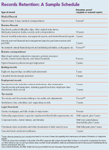Article
Tips for managing medical office document clutter
Clutter can impair office efficiency and even hamper revenue collection. Here's how to cure the too-much-paper bottleneck.
Ever hear of the Collyer brothers? They were the notorious hoarders from the 1940s whose Harlem brownstone reportedly contained 100 tons of collected newspapers, books, documents, and other . . . well, junk.
Some doctors' offices would make the Collyers feel right at home. "Paper, paper, paper everywhere," complains an internist in a two-physician practice in Dayton, OH. Another Ohio physician, an FP, acknowledges, "Despite computerized scheduling and billing, our office is drowning in paper. We have file cabinets and boxes filled with EOBs, billing forms, third-party contracts, manuals, deposit slips, accounting reports, corporate tax records, and much more."
These physicians may lean toward the extreme, but clutter plagues many practices, even in this age of electronic health records. The problem is complicated and the reasons varied, consultants observe. Clearly, some doctors are pack rats, just as some people in the general population are. Other physicians hoard out of fear. "They're paranoid about throwing something out that they're going to need down the line," says Judy Bee, a practice management consultant in La Jolla, CA. Still others never get around to straightening up, or view purge campaigns as a waste of staff time. "If someone's spending her day sifting through paper, she isn't calling back patients, confirming appointments, or doing other things that help the practice make money," says Keith Borglum, a consultant in Santa Rosa, CA.
By controlling the clutter bug, you can avoid this fate, and help your practice run more smoothly.
To get started, put a process in place
The key to gaining-or regaining-control of your paper glut is to establish a workable process and stick to it. Here's one such system, suggested by practice management consultant Kathryn I. Moghadas of Casselberry, FL. With some tweaking, it can be adapted to a range of practices and physician preferences:
• Develop a records retention schedule. If you're guilty of holding on to things for fear of discarding something important, this step is a must for you. A printed records retention schedule, prominently posted, takes the guesswork out of purging, letting you know how long to retain the various types of documents-whether medical, business, banking, or employment-related.

One caution, however: State laws differ not only on how long medical records must be retained but on the statute of limitations for malpractice suits. For this reason, consult your attorney or malpractice carrier before assigning a disposal date for patient charts, X-rays, and patient-related correspondence.
• Establish a first line of defense. The best way to avoid clutter is to prevent it from developing in the first place. Moghadas advises having a paper shredder within easy reach of the person on staff responsible for opening the mail. That way, junk mail that may contain identifying information can be securely discarded before piling up.





